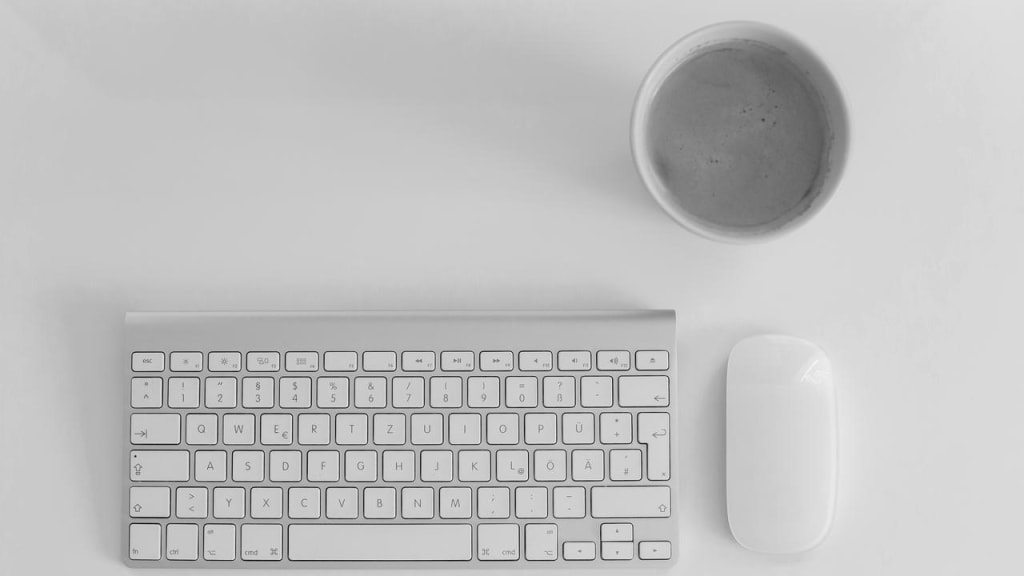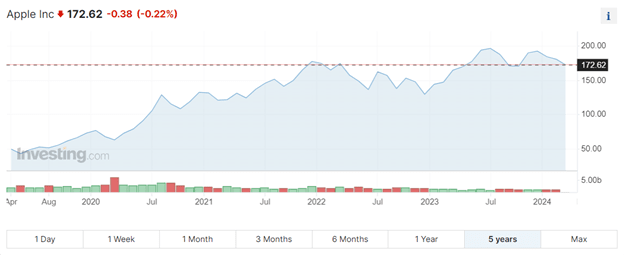Apple's stock is faltering amid the boom in tech stocks

While technology stocks are flying hot thanks to the artificial intelligence boom, one of the big names has been stuck in place, at least in terms of its share price.
This year, Apple's share is down more than seven percent, while the Nasdaq100 index produced a seven percent profit in the same period. However, when examining the five-year return, Apple's stock has returned twice as much as the Nasdaq. Currently, the company's share is trading at around 172 bucks.

Apple has lost some of its momentum, and at the same time sales of the latest iPhone model have been weaker than expected, especially due to sales in China.
The iPhone 15 was launched in September and its demand was in line with expectations around the world, except in China. The iPhone was launched at the same time as the Huawei Mate 60 Pro, so the timing was not ideal. The sentiment of the Chinese regarding the iPhone may also be changing, as Apple's production has been moved from China to India. China has also limited the use of iPhones as office phone for government employees.
In the last 12 months Apple's turnover has not grown contrary to expectations, but fell by 0.6 percent. At the same time, the turnover of many other large technology companies has grown by double-digit percentages. However, the stock has produced good returns in the last year, despite the revenue flattening.
The company's turnover decreased during the year, but earnings per share, or EPS, rose by an average of 8.8 percent. This was due to share buybacks and Apple's disciplined spending.
The Price-to-Earnings ratio P/E of Apple's stock is around 27, which is historically a high price for a company whose revenue is shrinking.
Apple has at least seemingly sat on the sidelines during the artificial intelligence frenzy. Last month, the company's CEO, Tim Cook, opened his verbal coffin enough to mention that actions will speak for themselves in the future. However a week later, the man said that Apple will launch revolutionary AI technology later this year.
During the latest MacBook Air product launch, Cook said that every Mac computer is an incomparable platform for artificial intelligence after the company switched to its own processors. "MacOS will provide AI-powered smart features that boost productivity and creativity, allowing users to take advantage of powerful camera features, real-time speech-to-text, translation, text prediction, visual understanding, accessibility features and more," Cook said.
Vontobel’s TLNG APL V27-turbo offers a leveraged product to seek returns on Apple's rising stock price. At the time of writing, the leverage of the product is 3.66 times, which corresponds to the 3.66 percent yield of the leveraged product when the Apple stock rises by one percent. If, contrary to expectations, the share price falls by one percent, the leveraged product incurs a loss of 3.66 percent.
With Vontobel's leveraged products, you can also aim for a return on the declining price of the Apple stock.TSRT APL V39-turbo offers, at the time of writing, a 5.6-fold leverage to the share's return. If Apple's stock falls by one percent, the leveraged product produces a profit of 5.6 percent. Turbo's value, on the other hand, decreases by 5.6 percent if Apple's share price rises by one percent.
Vontobel's investment products can be traded during the opening hours of the Helsinki Stock Exchange. When trading leveraged products, the risk of loss increases. Losing the entire invested capital is possible. Apple's share, which is the target asset, is quoted in US dollars, so the yield of the leveraged product also depends on the price changes of the EUR/USD currency pair. Investors bear Vontobel's credit risk when investing in Vontobel's products.
Risks
External author:
This information is in the sole responsibility of the guest author and does not necessarily represent the opinion of Bank Vontobel Europe AG or any other company of the Vontobel Group. The further development of the index or a company as well as its share price depends on a large number of company-, group- and sector-specific as well as economic factors. When forming his investment decision, each investor must take into account the risk of price losses. Please note that investing in these products will not generate ongoing income.
The products are not capital protected, in the worst case a total loss of the invested capital is possible. In the event of insolvency of the issuer and the guarantor, the investor bears the risk of a total loss of his investment. In any case, investors should note that past performance and / or analysts' opinions are no adequate indicator of future performance. The performance of the underlyings depends on a variety of economic, entrepreneurial and political factors that should be taken into account in the formation of a market expectation.
Credit risk of the issuer:
Investors in the products are exposed to the risk that the Issuer or the Guarantor may not be able to meet its obligations under the products. A total loss of the invested capital is possible. The products are not subject to any deposit protection.
Market risk:
The value of the products can fall significantly below the purchase price due to changes in market factors, especially if the value of the underlying asset falls. The products are not capital-protected
Risk with leverage products:
Due to the leverage effect, there is an increased risk of loss (risk of total loss) with leverage products, e.g. Bull & Bear Certificates, Warrants and Mini Futures.
Product costs:
Product and possible financing costs reduce the value of the products.
Currency risk:
If the product currency differs from the currency of the underlying asset, the value of a product will also depend on the exchange rate between the respective currencies. As a result, the value of a product can fluctuate significantly.
